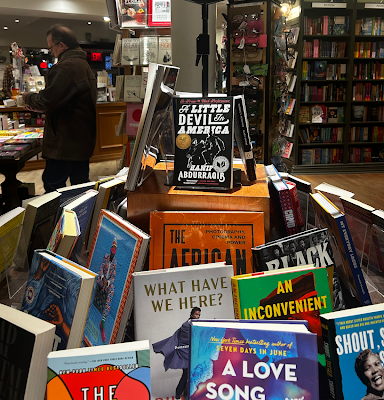
Dr. Jennifer Travis, the current chairperson of the St. John’s University English department, provided The Torch with five media categories that hold great importance to her.
Having chosen immensely meaningful pieces from adaptations, on my nightstand, podcasts, substack and must-read books for all college students, Travis highlighted many influential media choices, all with key themes at their core. Whether the media features a pandemic, gender discrimination, contemporary and looming wars, applying politics to wider contexts, or lessons about humanity, it emphasizes various components that make up the world around us. These pieces of media bring light to the realities of our world – past, present and potential future.
While this is not an exhaustive list, Travis focused on works that have meaning for her, “especially in the midst of the pandemic, which has been a time of great anxiety, fear and helplessness,” Travis said. “I have been gravitating towards works that remind me of the importance of community, kindness and our shared humanity.”
Travis is often found working diligently at her desk or speaking eloquently in front of a classroom, leading some to assume that Travis was born to be an English professor. “If you had told me when I was in college that I would become an English professor, I would have called you crazy,” Travis emphasized.
She was an English major — Travis received her bachelor’s degree. from Vassar College in New York and her master’s degree. and doctorate from Brandeis University in Massachusetts — and always enjoyed reading and talking about books. She thought she would work in publishing or for a literary agency as opposed to teaching. Travis worked at Zolan Books, a small literary press in Cambridge, Massachusetts and found her true calling in becoming a literary critic, writer and scholar. “I had two wonderful women mentors in college — faculty members in english and art history, who saw my potential and encouraged me to go to graduate school,” she said.
Although she is not usually a fan of movies or series made from books, one “notable exception,” is “Station Eleven” — a novel by Emily St. John Mandel and series on HBO. Travis looks back on when she read “Station Eleven” when it was first published in 2014. “It seemed to me the unlikeliest of stories: about a flu that kills most of the human population,” she said. “The novel follows some of the survivors, a band of actors and musicians, who travel and perform Shakespeare for small communities of fellow survivors.”
“The screen adaptation [of ‘Station Eleven’] has so much empathy, humanity, and reverence for the power and importance of art, I was deeply moved,” Travis continued. “I then re-read the novel, and found, to my surprise, the series was even better.”
One of Travis’s ‘on my nightstand’ recommendations is Lauren Groff’s “Matrix.” Groff’s “Matrix” focuses on female ambition and power in positions in which women were not thought of as able or wise enough to be in. Having recently finished “Matrix,” she describes it as “a stunning fictional account of 12th century writer Marie de France and Catholicism, the position of women in the church, and one woman’s strength and vision.”
On the other hand, podcasts are often Travis’s media of choice. “I love ‘The Roxane Gay Agenda’ (and previously ‘Hear to Slay’ with Tressie McMillam Cottom).” “The Roxane Gay Agenda” is a podcast that stars writer Roxane Gay, alongside various guests, in which they converse about important issues. On the agenda is feminism, race, writing, pop culture and politics. “Hear to Slay” also stars Gay, as well as Tressie McMillam Cottom, and focuses the conversation on things they love. The two express their perspectives on many topics, including culture, love, life and everything in between.
She also recommends The Ezra Klein Show, a podcast starring Ezra Klein, an American journalist, that focuses on “something that matters.” Whether that be political, social, or economic issues, Klein covers it all.
“Klein is now doing a series of interviews with scholars and analysts on the war in Ukraine,” Travis added. “Klein is a good interviewer who always does his homework.”
Not only does Klein provide respectful questions to those he is interviewing, but he simply sits and listens to the responses; he respects the experiences of those who have experienced loss and tragedy from the war in Ukraine and allows them to have their stories be shared and heard.
“I also enjoy a good ‘Substack’ newsletter, and I regularly read the popular Heather Cox Richardson’s ‘Letters from an American.’,” Travis said. Substack is an online platform that allows just about anyone to create a digital newsletter, and hosts a variety of content. Richardson is a history professor at Boston College, and the newsletter “puts contemporary politics in the larger and wider context of American history and culture.” This ‘Substack’ newsletter is free, and often published daily. “I am in awe of her writing practice and prowess,” Travis concludes.
Two of Travis’s must-read books for all college students are Margaret Atwood’s “The Handmaid’s Tale” and Toni Morrison’s “Beloved.” Dr. Travis acknowledges that “The Handmaid’s Tale,” “may be categorized as speculative fiction,” but continues to say that it “feels far too real in our contemporary cultural moment.” Reading “Beloved” again with her American Literature and the Monstrous class, Dr. Travis describes the book as “one of the most powerful and important novels about slavery, motherhood, and personal and collective trauma.”
“These novels are brilliant and essential and teach their readers something new about the human condition every time we open their pages,” said Travis.







